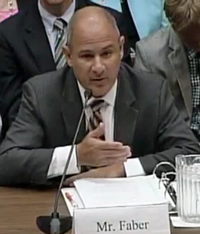During the recent Subcommittee on Energy and Power’s hearing to review the Renewable Fuels Standard (RFS) as well as during a recent RFS briefing sponsored by the Advanced Biofuels Association last week in D.C., the Environmental Working Group (EWG) made it very clear that they have no love for corn-based ethanol.
 Scott Faber, EWG senior vice president for government affairs said that to date, the RFS has failed to deliver the “good” biofuels that could help meet many of our environmental and energy challenges. “Instead, the RFS has delivered too many “bad” biofuels that increase greenhouse gas emissions, pollute our air and water, destroy critical habitat for wildlife and increase food and fuel prices.”
Scott Faber, EWG senior vice president for government affairs said that to date, the RFS has failed to deliver the “good” biofuels that could help meet many of our environmental and energy challenges. “Instead, the RFS has delivered too many “bad” biofuels that increase greenhouse gas emissions, pollute our air and water, destroy critical habitat for wildlife and increase food and fuel prices.”
Faber continued, “Since it was expanded in 2007, the corn ethanol mandate has contributed to plowing up more than 23 million acres of US wetlands and grasslands to plant crops –and area the size of Indiana….Although the RFS was promoted in 2005 and 2007 as a tool to address climate change, the Environmental Protection Agency’s own analysis has since shown that the lifecycle greenhouse gas emissions of corn ethanol were higher than gasoline last year (2012) and will be higher in 2017. All but three corn ethanol production pathways increased emissions in 2012, and only nine corn ethanol production pathways are expected to meet greenhouse gas reduction standards for corn ethanol in 2017.”
Listen to Scott Faber’s testimony: Scott Faber's Testimony
In response Growth Energy released the following statement:
“Today’s testimony by the Environmental Working Group is completely devoid of facts, and shows a fundamental disconnect in their understanding of the EPA’s data. What they fail to understand is that there would be no path forward under the RFS for ethanol if it does not meet certain GHG reductions. The EPA noted under the Energy Independence and Security Act of 2007, in which the RFS was strengthened, that the law ‘required a 20 percent reduction in lifecycle GHG emissions for any renewable fuel produced.’”
“Additionally, the EPA noted that, ‘The expanded use of renewable fuels is expected to reduce greenhouse gas emissions by 138 million metric tons when the program is fully implemented in 2022. The reductions would be equivalent to taking about 27 million vehicles off the road.’”
“Furthermore, an independent study published in the Yale Journal of Industrial Ecology found that traditional corn ethanol reduces GHG as much as 59 percent compared to gasoline.”
“So, this begs the question, after a history of environmental damage from Big Oil, does the Environmental Working Group truly believe oil is a cleaner, lower carbon intensive fuel? Apparently, rather than continue a program that does, in fact, reduce GHG emissions, improve our environment and create jobs at home, while providing a choice and savings for consumers at the pump, the Environmental Working Group would prefer we stay addicted to oil and the accidental, yet frequent spills and environmental disasters that have come along with our addiction over the last century.”

